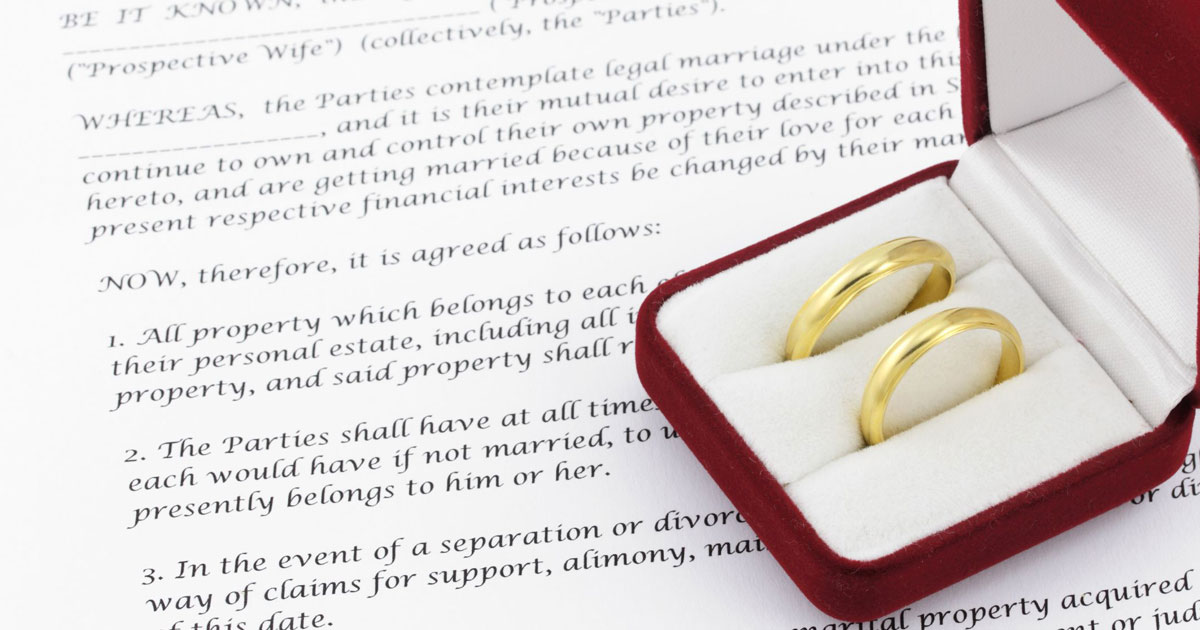Postnuptial agreements in Arizona, like prenuptial agreements, exist to protect both parties in the event of a later divorce. Before many Arizona couples get married, they sign a prenuptial agreement to protect themselves—and one another—financially in the event of a divorce. A prenuptial agreement protects the individual assets each had before they married and can establish certain terms should a divorce occur. However, not every couple establishes a prenuptial agreement and may gain assets after marriage that were not subject to the premarital agreement.
However, creating a postnuptial agreement without the help of an attorney can be challenging. Making sure that the agreement is fair to both parties involved is the primary objective, so the agreement will be upheld in court should a divorce occur.
What Are Postnuptial Agreements?
A postnuptial agreement is a legal contract between a married couple that outlines how their assets will be divided in the event of a divorce. Like a prenuptial agreement, a postnuptial agreement identifies the assets each party owns and outlines their division should divorce occur in the future. However, while postnuptial agreements cover much of the same ground as prenuptial or antenuptial agreements, the latter is signed before the marriage ceremony takes place. Postnuptial agreements can be signed at any time after the marriage takes place.
A postnuptial agreement can cover financial matters, such as property division and spousal support, in the event of a divorce. It can also be used to establish ground rules in terms of finances for the marriage.
There are many reasons couples may choose to enter into a postnuptial agreement. For example, one spouse may have acquired significantly more assets than the other after the couple married. Another common reason for a postnuptial agreement is that one spouse receives an inheritance after the couple is married, and they wish to protect these assets in the event of a divorce. Additionally, couples who have been married for several years may decide to sign a postnuptial agreement to avoid potential disagreements about asset division should there be problems in the future.
It is important to note that postnuptial agreements are not just for wealthy couples. All marriages are eligible for a postnuptial agreement, and any couple may choose to create one if they so desire. While these forms of legal documents are straightforward enough, it is recommended that couples seek legal counsel before drafting a postnuptial agreement, as there are certain legal requirements that must be met for the agreement to be valid. Having an attorney also protects both parties from taking advantage of the other with an agreement that is cleverly written to appear fair enough to hold up in court but turns out to be one-sided.
How Can You Create a Postnuptial Agreement in Arizona?

There are a few things you should keep in mind when planning a postnuptial agreement to ensure it is fair for both parties.
- Both parties should have legal representation. A neutral council or separate attorneys can ensure both you and your spouse understand the agreement and that neither side is being taken advantage of.
- Discuss your goals first. Establish the intended goal of the agreement with your spouse, and then create terms that result in that primary goal.
- Be clear about what you want the agreement to cover. The agreement should clearly and directly outline the assets protected in the event of a divorce. It should address both parties’ assets before and after the marriage as well as any potential income earned in the future over the indefinite time of the marriage.
- The agreement must be enforceable. In other words, if one party is unable to uphold the terms of the agreement, it covers topics not allowed by the Arizona court, or it is unreasonable and unfair, the court will refuse to enforce it.
- The agreement must be in writing and must be willingly signed by both parties, then notarized by a notary public.
Preparing for a Postnuptial Agreement
The preliminary phases of postnuptial planning are the most tedious but also the most important. You and your spouse should use this time to decide which asset types you want to cover in the agreement. You will also need to gather all relevant financial information. This includes things like bank account statements, investment accounts, and property ownership documents. Once you have this information, you can begin to draft the agreement with the help of your attorney.
It is important to remember that fairness is relative. What may seem fair to one spouse may seem unfair to the other, especially if one spouse retains individual assets that give them financial advantages over the other.
There may be some disagreement among couples during this stage, so to ensure a healthy and productive discussion, consider these general principles that can help guide you in creating an agreement that is fair for both parties involved.
- All assets and debts should be disclosed upfront. This way, each person knows every detail of the proposed agreement, and there are no surprises down the road.
- Any assets acquired during the marriage should be divided equitably between the two spouses.
- Any provisions regarding spousal maintenance should be reasonable and based on each spouse’s individual circumstances.
Postnuptial Agreements and Arizona’s Community Property Statute
It is especially important to request attorney assistance with creating your postnuptial agreement because Arizona is a community property state. This means that any asset purchased, acquired, or earned during a marriage, regardless of who paid for it, who uses it, or whose name is on the title, is considered marital property. All marital property is divided equitably during the property division stage of a divorce.
Thus, in attempting to divide assets prematurely in the event of a potential future divorce, care should be taken to write an agreement that will be deemed fair in the court’s eyes. If all goes well, in the event of a divorce, your contract will be upheld by the court. You and your spouse will achieve a fair distribution of assets without the need for extensive litigation.
What Happens if a Postnuptial Agreement Is Not Followed?
If a postnuptial agreement is not followed by either party after divorce or separation occurs, the court may not enforce the agreement. Because a postnuptial agreement is created after the marriage occurs, they are often more difficult to enforce. Postnuptial address assets that at this point may have become marital assets, as well as separate assets. As a result, depending on how much time has passed since the agreement was signed, circumstances may have changed significantly.
If either party disagrees with the postnuptial agreement by the time the marriage ends and disputes the agreement during divorce, the court must determine whether its terms are valid and whether to enforce the agreement. In many circumstances, the court may choose to enforce some portions of a prenuptial agreement but not others. If one party does not adhere to a postnuptial agreement, the court’s decision to uphold or invalidate the agreement will depend on whether circumstances have changed since it was created, whether the agreement was unfair, or whether the person simply wishes to renege on the contract.
Is There an Arizona Postnuptial Agreement Statute?
While Arizona does not have any written statutes regarding postnuptial law, Arizona courts do recognize these agreements as valid by virtue of precedent cases. Furthermore, postnuptial agreements are written in the hopes that the agreement made will enable the couple to settle the terms of their divorce outside of court. This means many postnuptial agreements never have to see a judge or face a court ruling.
Both prenuptial agreements and postnuptial agreements enable the couple to make decisions now rather than in the future when divorce looms. A solid postnuptial agreement signed now can help you achieve an uncontested divorce later, regardless of the lack of an Arizona statute dictating the terms of its enforcement. An uncontested divorce is cheaper, easier, faster, less stressful, and less hurtful than a divorce with drawn-out litigation.
What Should You Avoid Including in a Postnuptial Agreement?
There are many things that will negate the legitimacy of a postnuptial agreement. For this reason, you should employ the aid of an attorney while drafting your agreement, so you can avoid making mistakes like the ones listed below.
A postnuptial agreement should not include statements governing the following conditions:
- Waivers of child support
- Custody terms, visitation terms, specific schedules, or any parenting time arrangements that prevent one parent from seeking custody or maintaining a relationship with children from the marriage
- Immoral, illegal, or unconscionable acts by either party
- Prevention of domestic abuse victims from pursuing legal assistance and help
- Acts of public policy violation performed by either party
- Penalization of either party for filing for divorce or separation
- Spousal maintenance waivers that put one spouse below the threshold for state assistance
How Can Postnuptial Agreements Benefit You?

Postnuptial agreements are created because, if done well, they are beneficial to both spouses involved. Benefits include the following.
Postnuptial Agreements Reduce the Time and Expense Spent in Court
When couples divorce without a prenuptial or postnuptial agreement, they often battle over property division in court, which can be a costly and time-consuming process. Creating a postnuptial agreement can help you avoid costly court battles by predetermining financial matters like property division before the divorce occurs, reducing the need for lengthy litigation.
A Postnuptial Agreement Can Strengthen the Financial Foundation of a Marriage
Writing a postnuptial agreement during a marriage forces both spouses to sit down and discuss their finances and what would, should, or could happen in the event of a divorce. In most cases, these discussions produce valid solutions to potential mishaps, and the resulting postnuptial agreement puts them in writing. When both spouses are on the same page about financial matters, they tend to carry that perspective with them throughout the marriage, even if divorce never occurs.
Postnuptial Agreements Can Build Trust in a Marriage
Creating a postnuptial agreement is a process that, as mentioned above, requires openness and honesty. During this process, couples will learn valuable insights about one another, whether they end up divorcing or not. In fact, having a postnuptial agreement can benefit a marriage by virtue of the fact that the outcome of one of the most contentious issues in marriage—finances—is already predetermined. By answering these questions in advance, they lose the power to come between two people in marriage. In addition, seeing the consequences of divorce in advance oftentimes dulls its appeal.
How Can Children Be Affected by Postnuptial Agreements?
Family matters like child custody and child support cannot be determined in a postnuptial agreement. These must be determined in Arizona family court at the time of divorce. However, postnuptial agreements can still affect children in multiple ways. For this reason, if children are involved, it is extremely important to consider their well-being when drafting a postnuptial agreement.
First, the division of property should not leave children without necessary resources like food, clothing, and other resources. Therefore, although your postnuptial agreement should not directly delineate child support, take care to make sure your agreement does not deprive them of adequate financial support. Drafting a fair and equitable postnuptial agreement can help you ensure your children are properly cared for regardless of the parenting time allotted to each parent.
In addition, if one spouse has children from another marriage, a postnuptial agreement can help to protect assets and inheritances belonging to their parent. In this way, postnuptial agreements can preserve existing children’s rights to inherit these assets if their parent should pass away during the marriage.
It is important to note that even if the court does not enforce your postnuptial agreement, it can still be used as evidence in divorce proceedings. Even though the postnuptial agreement will not necessarily define family matters, it could be useful in determining them. In other words, if there are any disputed issues in family court, such as custody or child support, the court may consider the terms of the agreement when making its decision. While this doesn’t mean the agreement is enforced, it could still be useful where children are concerned.
Drafting a Postnuptial Agreement?

A postnuptial agreement can be a useful tool in any marriage, even if you do not anticipate your marriage ending in divorce. However, before you and your spouse draft and sign a postnuptial agreement, you should consult with an attorney to ensure that it is valid and enforceable by Arizona Family Court.

Jonathan Roeder is one of the founding partners of The Valley Law Group. He is an Arizona native who has dedicated his life and career to the service of others. After graduating salutatorian of his high school class, Jonathan attended beautiful and prestigious Pepperdine University, where he majored in Political Science. During his tenure at Pepperdine University, his passion for helping others grew after securing a clinical position with a residential treatment center for juveniles with substance addictions. Post-graduation, Jonathan returned to Arizona and served as a residential manager for mentally and physically disabled homes.

